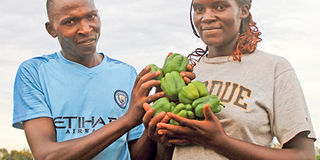From boda boda to shining farmer

Benson Musembi with his wife Dorcas Wambua display capsicum they have just harvested in their farm. He reveals that the farm earns the family of three a net income of more than Sh150,000 per month and more food than they need. PHOTO | PIUS MAUNDU | NMG
What you need to know:
- He reveals that the farm earns the family of three a net income of more than Sh150,000 per month and more food than they need.
- At that time, they had no meaningful income but they had a virgin piece of family land near River Tawa. They then got into farming the following year.
- Although they consult agronomists when they are stuck, they have amassed plenty of farming knowledge on the job.
The winding Tawa-Itangini Road, which cuts through rolling hills in Makueni, often exposes travellers to dry farmlands during drought and breathtaking greenery during the rainy season.
Tucked some 300m from where the all-weather road branches off at Kwa Minzyoka Market is a farm that normally teems with cabbages, capsicum, French beans, sukuma wiki, tomatoes and melons.
The farm belongs to Dorcas Wambua, 24, and her husband, Benson Musembi, 28. The couple is tending to their capsicum crop on the farm near River Tawa when Seeds of Gold team visits.
“We started with a small tomato farm where we grew seeds from a 50g sachet that cost Sh750, which I had saved when I was operating boda boda,” says Musembi, who currently farms on the entire two-acre family farm.
He reveals that the farm earns the family of three a net income of more than Sh150,000 per month and more food than they need.
So flourishing has been the agribusiness that the couple recently acquired a Toyota Probox worth Sh750,000 after selling 32 tonnes of watermelons.
“Our customers come for the produce on the farm. But sometimes I take the harvest to surrounding markets,” says the soft-spoken Musembi, who together with his wife, has become an agribusiness success poster child in the region.
The former secondary school lovebirds settled down in 2014, three years after graduating from Kakuswi Secondary School, where they were classmates.
At that time, they had no meaningful income but they had a virgin piece of family land near River Tawa. They then got into farming the following year.
“I thought of farming after I had spent years in Nairobi doing menial work and operated a boda boda for one year shuttling between Tawa and Kwa Minzyoka,” recounts Musembi.
TIMING OF PLANTING
During the rainy seasons, they grow maize, beans and pigeon peas. We then switch to cabbages, capsicum, French beans, sukuma wiki, tomatoes, and water melons in between rainy seasons. There is more money in irrigated farming than there is in the rain-fed farming,” says Dorcas.
Although they consult agronomists when they are stuck, they have amassed plenty of farming knowledge on the job.
“To try a new crop, for instance, we start by introducing it on a small plot and taking note of its development. In case we do not get it right during the trial, we keep varying the conditions until we get a perfect crop. Until we get to this stage, we do not expand the farming,” she says.
Timing of planting is key, says Dorcas, noting it ensures that the maturity of the crops coincide with low supply of produce in the market.
“In the case of cabbage, we transplant the seedlings towards the end of the rainy season so that irrigation will be needed for a short duration. This saves on the cost of pumping water,” says Musembi, noting they sell each for between Sh30 and Sh70.
For watermelons, he sells them to a trader from Thika at a constant price of Sh23 per kilo.
The biggest challenge to their enterprise is drought. They irrigate the crops using water drawn from a dam build across River Tawa by African Sand Dam Foundation, a non-governmental organisation.
Cornelius Kyalo, a director at the organisation, says sand dams are effective in solving water problems in dry areas.
Mr George Kamami, who heads a World Food Programme-funded project on promoting sustainable food systems in Makueni, advises that budding farmers should adopt appropriate technologies, access inputs and market collectively for their ventures to be sustainable.
“Use of drip irrigation reduces the cost of production as it cuts the workforce needed for watering, application of fertilisers and pesticides,” he says.




